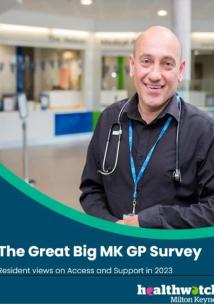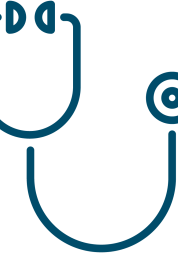Our findings: The Great Big GP Access Survey

Over the past three years, even with the well-documented issues around dentistry and hospital waiting lists, GP access and support remain the highest priority for Milton Keynes residents. This isn’t surprising. It’s the health service we use most regularly, and often it is the gateway for referrals to hospital care, mental health support and community health services. GPs are also our first port of call when we feel unwell or when we want to talk about preventing ill health.
Recommendations
Thanks to your feedback, experiences and suggestions, we're urging the Integrated Care Board and local GP surgeries to implement these four key recommendations:
- Triage:
- Develop high-quality training packages and ongoing support for GP reception and triage staff.
- Support practices to communicate to their patients how assessment and triage procedures work in their own practice, how confidentiality is managed, and clearly invite their feedback.
- Demonstrate how triage processes are reviewed and improved in dialogue with patients and carers.
- Consider ways to support effective Patient Participation Groups.
- Ensure GPs (and all primary care service providers) are compliant with the Accessible Information Standards and the Equality Act 2010.
- Work with patients to improve access to advanced booking for non-emergency appointments, create easy and consistent digital access to appointment systems, and improve the process for cancelling appointments.
Here's a flavour of what you told us:
“As an older person with disabilities and a carer for a disabled husband, it was very worrying to change practices after so many years.”
“The waiting time is 45 minutes no matter what time you call and then you get the receptionist telling you that there is no appointments so call again at 8am the next day.”
“Sometimes they close the online booking system, so it is not possible to make any appointments, emergency or otherwise.”
“Receptionists seem to be trained to stop you asking for/making an appointment at all costs.”
How did the NHS respond?
The Bedfordshire, Luton and Milton Keynes Integrated Care Board have sent us this response.
"Thank you for The Great Big MK GP Survey. The survey helpfully highlights a number of key issues that we are working to address through our response to the Fuller Stocktake and the Delivery Plan for Recovering Access to Primary Care.
We know generally that whilst most of our residents have good experiences of care and support from their practice team that getting through on the telephone and being able to book an appointment in a reasonable timescale is reported as a problem for a number of our residents.
Whilst we recognise there is work to do with our residents, stakeholders and practice teams we are incredibly proud of general practice in BLMK. Appointment numbers in BLMK continue to increase. Between 21/22 and 22/23 we saw an increase in appointment numbers of 4.05%. And in 23/24 appointment numbers are again showing an increase on appointment numbers from 22/23, when comparing April to Oct 23 with the same period in 2022 we have seen an increase in appointments of 5.94%. In Milton Keynes when comparing August, September and October 2022 to the same months in 2023 there has been an 8.81% increase in appointment.
Our response to Healthwatch Milton Keynes' recommendations as follows:
1) The Integrated Care Board should fully recognise the greater and more complex role that GP Receptionists have taken on.
a) Develop high quality training packages and ongoing support for GP Reception and Triage personnel.
b) Support practices to communicate to their patients how assessment and triage procedures work in their own practice, how confidentiality is managed, and clearly invite their feedback.
c) Demonstrate how triage processes are reviewed and improved in dialogue with patients and carers. Improvements made to triage and internal referrals to other health professionals, and how these are communicated to patients, in addition to measuring patient experience of these processes can make a positive impact to appointment availability, patient confidence in triage procedures and patient and receptionist relationships.
A key element of our plan is to provide care navigation training to all reception/administrators and formally recognise this change in role. We are currently reviewing how many practice staff have accessed the NHSE care navigation training and are exploring additional local training to ensure we have as wide a coverage as possible. Care navigation is central to the ambition to deliver modern general practice access.
We know that the changes practices make need to be codesigned with their residents and the work with Healthwatch colleagues to support the development of PPGs [Patient Participation Groups] (at PCN or practice level) is crucial.
2. Primary Care teams must innovate and co-produce with their communities, access solutions to transform current cultural norms of channelling patients through emergency only pathways.
The ICB led prevention plan aims to develop resident empowerment for self-management and alongside clear and regular communication to residents, the development and use of MiDOS and improved signposting and care navigation we are seeking to reduce reliance on urgent and emergency care.
We are also keen to ‘open up’ as many self-referral pathways as possible to support residents and reduce the need to have an appointment with the practice team when a different service is more suited to the presenting need.
We have seen the reduction of 111 ‘in hours’ call volume that can occur if residents can get through to the practice they are registered with and know on the day how their need will be responded to. Modern General Practice Access as described in the NHSE Delivery Plan for Recovering Access to Primary Care sets out a vision for residents to get through more easily and tackling the 8am rush (facilitated by Cloud Based Telephone and the use of digital technology) and by patients no longer being asked to call back another day to book an appointment. Currently we are working with the practices in Milton Keynes on their plans to provide a modern general practice access model by the 31st of March 2025.
3) The Integrated Care Board must develop a method of ensuring Primary Care service providers are compliant with the Accessible Information Standards and the Equality Act 2010.
We will continue to use every opportunity to remind practices of the requirements and ensure adequate training is arranged through PLT/Z/HEAT sessions. This requires an ongoing approach.
4) The Integrated Care Board must consider ways it can support the development and sustainability of effective Patient Participation Groups as a golden thread of the Fuller Neighbourhood development.
We very much welcome the work being progressed by Healthwatch in response to the Denny Review along with the established work of the ICB Primary Care Team to facilitate further representative PPGs are in place at either a practice or a PCN level. I have scheduled a substantive discussion regarding PPGs for the February Primary Care Delivery Group in order to co-design an approach that is sensitive to the respective neighbourhoods and places.
